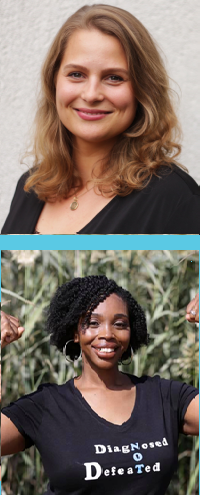Today, it’s my great pleasure to introduce Dr. Phyllisa Deroze as the newest member of the editorial board of the Ascensia Global Blog. She has been a highly respected advocate, blogger and speaker in the diabetes online community since 2011. Not only is she a graduate of Florida State University (BA), University of Albany, S.U.N.Y. (MA), and Pennsylvania State University (MA and PhD), she is also a literature scholar who writes about the intersectionality of health, race, gender, and disability in literature and popular culture.
In my opinion, Phyllisa’s contribution to the diabetes online community is invaluable. I first met her a couple of years back at the IDF World Diabetes Congress 2017 in Abu Dhabi, where she gave talks on the importance of peer-to-peer support and the need to focus on diabetes prevention. I was actually supposed to participate in a workshop, but I was so intrigued by the topics she was presenting that I snuck out to hear Phyllisa speak. The name of her website “Black Diabetic Info” had made me think: I was aware that many BIPOC lived with diabetes, but I didn’t realize to what extent their experiences differed from those of white people with diabetes. While listening to Phyllisa speak, I realized how ignorant I had been. She really opened my eyes to racial inequalities and the need for culturally competent information in diabetes care.
That’s why I couldn’t be more excited that Phyllisa agreed to join this editorial board. I am certain that she will deliver many interesting and valuable insights and perspectives in her articles and can’t wait to read them. Instead of talking about her further, I have invited her to share her story, in her own words, in the following interview.
Steffi: Phyllisa welcome to the editorial board of the Ascensia Global Blog! Tell us a bit about yourself and the topics that you plan to write about.
Phyllisa: Hello Steffi. First, I want to say thank you for coming to my IDF session and it is a delight to hear that it had an impact on you. Secondly, I’d like to say that I am thrilled to be a part of the editorial board with you and the rest of the diabetes advocates who are using their writing to help bring awareness to our experiences. My goal is to write about a diverse range of topics including traveling with diabetes, misdiagnosis, and navigating cultural norms while managing diabetes.
Steffi: Your diagnosis story has some real twists and turns. Can you tell us about what happened?
Phyllisa: Yes, I was diagnosed with Type 2 diabetes in 2011. Despite an increase in exercise, a decrease in body fat, and eating according to the restrictive guidelines recommended for people with T2D, my A1C was steadily increasing. Initially, I was told, “diabetes is a progressive disease, so that’s what’s happening.” Then I inquired about getting Type 1 antibody testing, but was denied. I was denied antibody testing for over a year by every endocrinologist that I saw. Ultimately, I pleaded with my OBGYN who agreed to test me and that is when I found out that I have Type 1 diabetes, or more specifically, Latent Autoimmune Diabetes in Adults (LADA), in the fall of 2019.
Steffi: What does your life with diabetes look like these days? What are the challenges you face and what sparks some diabetes-related joy?
Phyllisa: Now, I’m adjusting to living with T1D which is different from T2D in a few respects. First, I carry less guilt and shame. I can eat a cookie and have the means to lower my blood sugar. I have access to different technology. I’ve been assured that diabetes isn’t my fault in a variety of ways. I do believe there still exists an awful divide within our diabetes community between those with different types and I hope we can encourage more understanding and collaboration among all those with diabetes. I truly believe that we can work on changing the messaging around the types. I get asked often about why more people with T2D don’t speak out or are active online, but the reality is, messaging that blames the person with diabetes (PWD) for causing themselves to get diabetes can take a huge toll on their mental health and desire to be involved in the DOC. My diabetes-joy is sparked by sharing my experiences and knowing that they help, inspire, educate, and/or motivate someone else.
Steffi: Do you have a piece of diabetes-related wisdom that you wish you had known at the time of your diagnosis?
Phyllisa: Since I was diagnosed with diabetes twice, I will share two pieces of wisdom. First, if you’re diagnosed with type 2 diabetes ask for antibody testing. This could prevent others fron having my experience of being misdiagnosed for eight years. Second, if you’re diagnosed with type 1 diabetes, make sure to ask about the availability of insulin pump in your country and how you might be able to arrange to try one. Many people are “ready” at different times in their diabetes journey, but make sure that you know what your options are going forward. You may find that you prefer multiple daily injections, but you should have the right to choose.
Steffi: Thank you so much for sharing your journey with us, Phyllisa. We can’t wait to read more! In the meantime, where can people follow you and learn more about you?
Phyllisa: I’m most active on Instagram at BlackDiabeticInfo, but I can also be found on Twitter at @not_defeated



